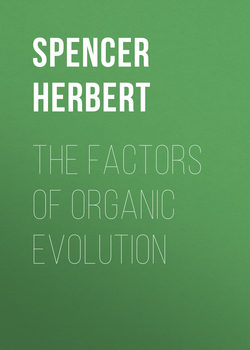Читать книгу The Factors of Organic Evolution - Spencer Herbert - Страница 1
ОглавлениеPREFACE
The two parts of which this Essay consists, originally published in The Nineteenth Century for April and May 1886 respectively, now reappear with the assent of the proprietor and editor of that periodical, to whom my thanks are due for his courtesy in giving it. Some passages of considerable length which, with a view to needful brevity, were omitted when the articles first appeared, have been restored.
Though the direct bearings of the arguments contained in this Essay are biological, the argument contained in its first half has indirect bearings upon Psychology, Ethics, and Sociology. My belief in the profound importance of these indirect bearings, was originally a chief prompter to set forth the argument; and it now prompts me to re-issue it in permanent form.
Though mental phenomena of many kinds, and especially of the simpler kinds, are explicable only as resulting from the natural selection of favourable variations; yet there are, I believe, still more numerous mental phenomena, including all those of any considerable complexity, which cannot be explained otherwise than as results of the inheritance of functionally-produced modifications. What theory of psychological evolution is espoused, thus depends on acceptance or rejection of the doctrine that not only in the individual, but in the successions of individuals, use and disuse of parts produce respectively increase and decrease of them.
Of course there are involved the conceptions we form of the genesis and nature of our higher emotions; and, by implication, the conceptions we form of our moral intuitions. If functionally-produced modifications are inheritable, then the mental associations habitually produced in individuals by experiences of the relations between actions and their consequences, pleasurable or painful, may, in the successions of individuals, generate innate tendencies to like or dislike such actions. But if not, the genesis of such tendencies is, as we shall see, not satisfactorily explicable.
That our sociological beliefs must also be profoundly affected by the conclusions we draw on this point, is obvious. If a nation is modified en masse by transmission of the effects produced on the natures of its members by those modes of daily activity which its institutions and circumstances involve; then we must infer that such institutions and circumstances mould its members far more rapidly and comprehensively than they can do if the sole cause of adaptation to them is the more frequent survival of individuals who happen to have varied in favourable ways.
I will add only that, considering the width and depth of the effects which acceptance of one or other of these hypotheses must have on our views of Life, Mind, Morals, and Politics, the question – Which of them is true? demands, beyond all other questions whatever, the attention of scientific men.
Brighton, January, 1887.
